Dr. Cynthia Owens knew from a young age that she wanted to go to medical school, serve a mission, and be a mother. With guidance from the Lord and from earthly mentors, and with the support of her family, she accomplished all three goals. In partnership with her husband, she has raised four children while working part-time as a pediatrician. Keeping balance in her life has been a matter of effort and prayer, but she has been inspired by prophetic counsel and by her patriarchal blessing to embrace the fullness life has to offer and take joy in it all.
Tell me a little bit about your family growing up. Your father was a doctor, right?
Yes, he was. He was a surgical oncologist and did a lot of research. I’m number five of six children and the only one who went into medicine. I have four great brothers and a sister with whom I’m very close.
What was your process in choosing medicine?
Well, it’s rather a long story! There have there been several blessings and pivotal experiences that have made going into medicine smoother for me.
Perhaps the first one is something that I had no idea at the time would lead to medicine. When I was a sophomore in high school, a friend said off the cuff, “Oh, you ought to skip a grade.” For some reason, it resonated, and I didn’t know why, but I felt that I should. Later I had to make the difficult choice of whether or not I was going to go on a mission or go to medical school, and I felt like I should do both—having skipped a grade allowed me to do both.
Going into medicine was a very different path than what you were expecting in high school. What made you want to go into medicine?
In high school I thought I’d go into music, so the switch to medicine was very big for me. Also, at the time I chose to go into medicine, there really weren’t options of being a physician’s assistant or a nurse practitioner like there are today. It wasn’t so much that I was enamored with the idea of becoming a doctor—I had taught piano lessons when I was in high school and was even accepted into a music school after graduating early, so I thought that’s what I was going to do. But then I was asked to fill in for my dad’s secretary for a few days. It was so striking to me to see the difference between the attitude of my students—some of whom really didn’t want to be taking piano lessons—and my father’s patients, some of whom were literally dying to see him. They were hoping he could prolong their lives or cure them and I thought, “I want to be involved in helping people in a really meaningful way.”
I know that performing music and teaching is a very meaningful way to help people, but at the time, the thought of being a doctor and helping people who desperately wanted help was very exciting. In my patriarchal blessing it said that “my soul would thrill with joy as I served.” As I was in my father’s office, I felt that joy and thought, “This is how I want to serve.”
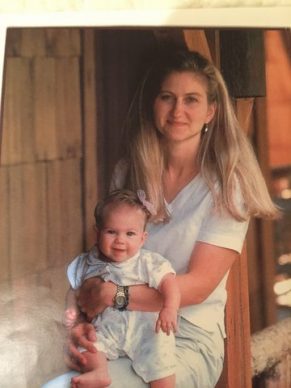
Cynthia
So how old were you when you made these decisions, both to serve a mission and to go into medicine?
I had wanted to serve as a mission since I was about 12 years old. When I came to feel that I should go into medicine, I wasn’t sure how that would fit. When I turned twenty-one and was finally old enough to go on a mission, I was just graduating from college and applying to medical school. I had a strong spiritual impression that I should go on a mission. My father felt like medical school and training would be so long that I wouldn’t make through if I went on a mission, so he didn’t want me to go on a mission. I talked with my bishop who said, “I really can’t extend a call to you unless your father feels good about it.” I finally said, “I know that my next step is serving a mission, and if it means not going to medical school, then so be it.” But in my heart I really wanted to do both, so I actually applied to medical school and interviewed before I went on my mission. I ended up getting accepted to medical school when I was on my mission.
Oh wow!
Yeah! So I started three weeks after I got back.
While I was still applying and was leaving to flying out for an interview, my sister said to me, “What are you doing? That school is so expensive, and you’ll have such a huge debt that you won’t be able to fulfill your dream of working part-time.” My only response was, “I just feel like I need to take the next step and that I need to go.” And it was absolutely remarkable, because not only did I get my acceptance to medical school while I was on my mission and they let me defer it a year, but my grandmother to my great surprise offered to pay for all of my medical school!
Oh, that’s beautiful. And that also takes a lot of faith, not knowing what’s going to happen but feeling like it was right.
One of my father’s favorite hymns was “Lead, Kindly Light” and that phrase, “one step enough for me” has been a theme in our family. Not “to see the distant scene,” but to take the next step and keep going forward.
Were there any people outside of your family—any female mentors, perhaps—who shared their own experiences with you to give you perspective and help you keep moving forward?
At that time—in the late 1970s—there weren’t that many female physicians, particularly not many with children or who were involved in the details of their children’s lives, and who were still married. So it was hard to find a role model. But my father found one for me, and that was Dr. Liz Hammond. She is a brilliant pathologist, and a very nurturing mother and a faithful LDS woman. I met her and she told me, “The most important determining factor in your having a happy family life and a career is the man you marry.”
My husband, Doug, has made all the difference in helping me be able to have a happy family life and to have any balance. He’s been a huge influence. He’s a really unique, wonderful person and his parents also had a big influence on him. His mother was bright and stayed at home full-time when her children were home. She had great wisdom and ability and Doug’s father always respected her. Wayne had great respect for women. His fatherly advice before we got married was to make sure that my career was just as important as Doug’s. Which is unusual advice for a father-in-law to give.
When I decided to marry Doug, it wasn’t so much because of a checklist of things we had in common. In addition to being attracted to him and loving him, I knew we shared a similar vision for what I wanted to do as a mother and as a woman. He felt that what I was setting out to do in medicine was important, and he also felt that what I could do in the home was important. So even though I didn’t know exactly how I wanted to work it out, I had faith in our future together. I had no idea that in the end he would end up sacrificing so much, but he has sacrificed to make my career possible, and I’d like to think that I’ve supported him too in reaching for his goals. He recently quit his law practice for 3 years to run for a political office.
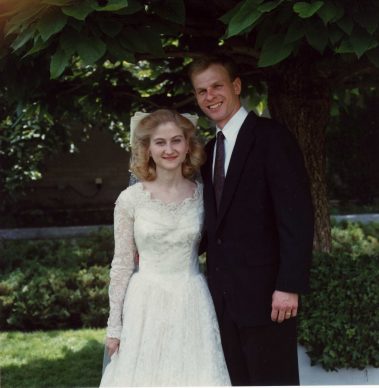
Cynthia and Doug on their wedding day
Is there any counsel that has been particularly meaningful to you?
When President Benson had the special fireside for women in 1987 and called on mothers to come home and be at the crossroads, I was just one year into medical school and not married, but I tried to hear the counsel from the prophet with an eye of faith and an open heart, and I do believe his call was inspired. The principles he put forth are the ones I look back on often to try to keep perspective. On the other hand, there are also examples of prophets who called fathers away from their homes for years, when their wives had to be the sole support for their families. And we know that Brigham Young called certain women to leave their families to go back East to become doctors. I think of Ellis Shipp, for example. I also love the counsel from President Hinckley when he said, “It is the obligation of every woman of this church to get all the education she can. It will enlarge her life and increase her opportunities. It will provide her with marketable skills.” I personally think it’s important for every woman to seek divine guidance to know how she can use her time and talents to fill the measure of her creation and experience joy. No one knows like the Lord the gifts he has given us and for what end, or what opportunities will be ours and what burdens we may face.
Choosing a career and deciding how to use the talents God has given us are challenging questions for any woman. Do you have any advice?
I think how we make these decisions is about as individual as our fingerprints. But something that applies to all of us whether working inside or outside of our homes is that we are much more effective if we prioritize. It’s so easy to have our time sucked away! It’s a struggle for me. The other thing is to seek to know when the Lord would have us change our agendas and do something else. It’s important to be flexible.
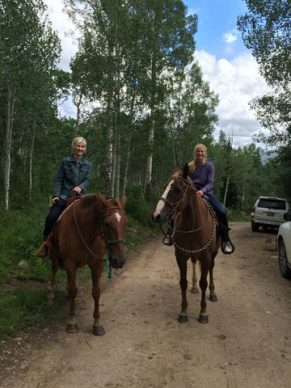
Cynthia and her daughter
Were there any times that come to mind when you had to be led along in your path of wanting both a career in medicine and to be a mother?
There were certainly some points along the way where I really had to reevaluate whether what I was doing what was right for me. While I was on my mission, I had a mission companion who was Austrian and took time off from medical school to go on a mission. So you might imagine we had some really interesting P-day discussions. The guidelines were different for missionaries outside of the US and what books they could bring, and one book she brought was Doctrines of Salvation by Joseph Fielding Smith. There are some really interesting things in there about women using birth control—it’s very strongly stated that if we limit our children in this life we can’t expect to have eternal increase in the life to come. And we both said, “We’re going to follow the prophet. And if we can’t use birth control, we can’t make it through medical school if we end up getting married.” We didn’t see how we could finish medical school and be the kind of mothers we wanted.
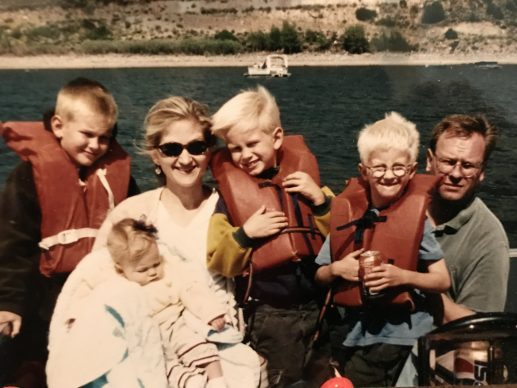
Cynthia and her young family
Birth control is a very sensitive subject inside and outside of the Church. What was helpful for you in grappling with this?
It was helpful that we had a wise mission president. When we told him we had decided we weren’t going to go into medicine because of this particular statement by Joseph Fielding Smith, he was very loving and respected our desire to be obedient, but counseled us, “You know, we can’t live in fear of what the future might hold. You have both felt that medicine is the course you should take with your life, and you shouldn’t stop just out of fear of the future.” And so that gave us both encouragement.
I’m sure there has been a lot of uncertainty in your life as you’ve figured out how to balance your family and medical career.
Yes, absolutely. For example, after Doug and I were engaged, he was at a more prestigious law school than my medical school, I tried to transfer to his school so he wouldn’t have to leave it. But the Dean of the Medical School said they didn’t accept transfer students. I remember just pouring my heart out to the Lord and promising him that if he would allow me to transfer and go to that school then I would not get caught up in any prestige it might bring. I promised that I would be willing at any point to quit my career and care for my family if it became too much of a conflict. And that’s always been a really important promise that I hold in my heart. I was able to transfer and be at the same school as Doug for the first year of our marriage. Then he graduated a year before I did and moved to Washington, D.C. while I finished school in Connecticut. That was the first time in our marriage when we commuted. We later commuted between Oregon and Utah when I was finishing my residency. It has not been a marriage of convenience.
There has been sacrifice on both sides, certainly. So when did you start having a family? What guided you in that process of being a mother, wife, and doctor?
When I got married, I wanted to keep the promise I had made with my mission companion that I wouldn’t use birth control unless I felt guided to. When it was time to make that decision, it felt absolutely clear that the Lord was fine with our choice to use birth control. About a year later, in my last year of medical school, I told Doug that I was really baby-hungry and wanted a baby, but it didn’t make any sense. I was going into my internship, and that is the hardest year of all the medical training. We decided it didn’t make sense to get pregnant then, but two or three months later we were surprised to find I was pregnant! I graduated seven months pregnant, but had another critical decision to make about whether to continue.
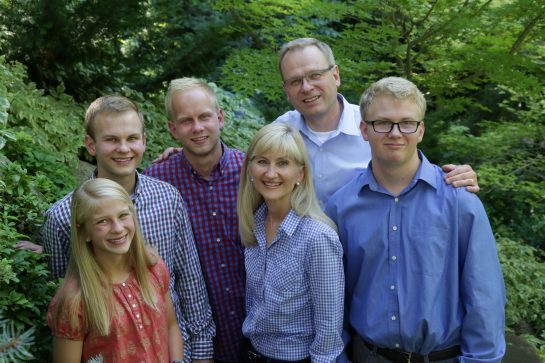
The Owens family
Was there anyone who helped you in that decision-making process?
I am very close to my older sister, and her example and insight were very helpful to me. I thought that since babies sleep a lot in their first year of life, maybe it would be less important to be home a lot then compared to the second year when the baby would be running around and interacting a lot. But my sister said to me, “No. It is critical for you as a new mother to embrace that role and be able to love it.” And I’m so grateful to my sister, because I wouldn’t have understood that.
What happened when interviewers found out you were pregnant? Did you let them know about how you wanted to be both a mother and a doctor?
I was just applying to residency programs when I first suspected I was pregnant. I was literally going in for interviews and didn’t want to lie if they asked when I was going to have children. (It was illegal, but they asked.) I bought my pregnancy test on the way home from the interviews. I really struggled with what to do. I will never forget exactly the moment it came to me. I was sitting in front of the Washington Monument, and it became clear to me that I should withdraw my applications. When I told Doug he said, “You know, I don’t want you to quit pursuing this dream because of me. I don’t want you to be angry at me later.” And I said, “No, this is not from any pressure from you at all. I feel incredible peace about this.” I remember later that night, waking up in the middle of the night and thinking, “What am I so happy about? What is it I feel such peace about?”
I called to withdraw my application the next day and said, “I’m withdrawing my application but I’m going to reapply next year” and explained why. One of the residency program directors said her baby was due the day after mine and invited me to go and interview anyway to see what I thought of the program. They were not the most prestigious program, but they offered me a guaranteed position for the following year. Eventually I was able to create my own part-time residency program. I was able to work full-time until I had my baby and then work one night a week in the ER for the rest of the year and then go back part-time. I was the first resident who had a part-time residency in that program and they ended up having a lot of people go part-time there after me.
You led the way. That’s really neat.
But of course it hasn’t been easy. Like I said, there have been many times I have re-evaluated whether or not I would continue working part-time. There was a time in my residency program where I really felt like it was hurting my family too much and I told the Lord I was done and that it was fine and I’d be happy to stay home. And I even went in to tell my senior resident that I was going to quit my internship. He was a spiritual person—a Seventh Day Adventist—and he asked me to pray about it again. And I’m so grateful he did because I prayed again and the answer was “No” to my surprise. It would have been easier and simpler to quit, but I was one month away from finishing my internship and being able to get my medical license, and it was very clear to me that the Lord wanted me to go back again the next day and keep doing it. I finished my internship, but four months later after my second son was born, I actually did withdraw from the program. The program offered to give me a leave of absence, but I didn’t know how long I’d need to be gone. The residents I worked with gave me their condolences and said, “You would have been a really good doctor. We’re so sorry you’re giving this up.”
That would be crushing to hear.
It was hard because I didn’t feel in my heart I was giving it up, I just knew that at that time I had to stop. It was a relief though to know I was doing what was right for me and my family and I loved being able to just focus on my family. I did end up going back after three years, but it’s interesting that it was Doug who sensed I needed to go back and finish my residency when it was time.
I was home full-time for a year, then worked for two years 9-5 two days a week. After we had our third baby, Doug offered to stay home full-time with our children so we could have a parent at home teaching them and so we could stay close. Doug was in a demanding law practice in DC and he took a ton of flak from other lawyers when he said he was quitting to stay at home with the kids. That was very unusual, especially back then. But he stayed home full-time when our children were one, three, and five years old. I took all my hardest rotations right up front so I could get back to the swing of the hospital and residency program.
After about three months I realized I had not fixed dinner once, I had not done any laundry, I hadn’t done anything to help around the house. I was really taken aback because I remembered how grateful I was when Doug would come home and I needed a break after being home all day. I told him I was so sorry I hadn’t given him a break. He was amazing and told me, “Whenever you’re home, I just want you to be with us. I can do that—I can do these other household things. I just want you to be with us.” And I thought, “Did I ever feel that way when I was home?” He’s been a huge support.
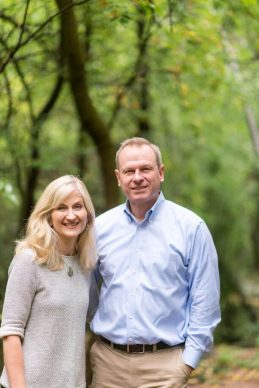
Cynthia and Doug
Like you said, who you ended up marrying mattered so much, not just for your family, but for your career. You help each other find focus and perspective, and that’s beautiful.
Yes, but it’s also important not to think that there will be one perfect day where everything will be balanced. When I was younger, I often thought, “Oh, once my kids are in school, I’ll get up extra early, and I can do it all.” And the truth is, I’ve learned I can’t. I’m grateful for the opportunities that I have, but my house is probably messier than most and everything doesn’t get done and I wish that I had more time to be with each one of my children. I work two long days a week and it’s still a struggle. Doug is helpful. He says, “If you haven’t finished those charts, if you haven’t finished those calls, just come home and see our children.” It’s a daily battle to keep balance, trying to know how I’m supposed to be doing it best today. There are some things that have to fall off the wagon that don’t get done quite as well, and we have to choose. But another quote from President Hinckley I love is, “You are doing the best you can, and that best results in good to yourself and to others. Do not nag yourself with a sense of failure. Get on your knees, and ask for the blessings of the Lord then stand on your feet and do what you’re asked to do. Then leave the matter in the hands of the Lord.”
With all the opportunities and blessings that we have in this day, it’s easy to think that we have to be perfect, but something has to give, even if we are home full-time. The house is not going to be perfectly clean, we are not going to be there on time to pick up our children every single time, and we just have to do our best and His grace is sufficient. When we turn it over to the Lord, I feel like it works out well enough.
Thank you so much for all the wisdom and experiences you’ve already shared. Is there anything else you would like to talk about before we end the interview?
Something I’ve been thinking about recently (and during this interview) is a line in my patriarchal blessing, and I think it is a beautiful mantra for all women. It says, “Go forth with vigor in your womanhood, enjoying life to the fullest.” I really feel that’s true. I shouldn’t try to limit what I try to do for fear of what challenges there might be in the future. And it’s so hard to know sometimes how to juggle everything, but I think that admonition from the Lord to me to live life to the fullest and go forth with vigor in my womanhood—particularly womanhood—has been a source of joy. I feel like women connect with our hearts in such a special way. I love the sisterhood we have in Relief Society and I’m so close to my sister and my mother and so many wonderful women in my life and it just seems like sisterhood is unlike anything else. And I’m so grateful to be a woman, especially with all the opportunities we have today. And I’m so grateful for the gospel to guide me in these days, because I don’t think that I could have the perspective that I do without the gospel.
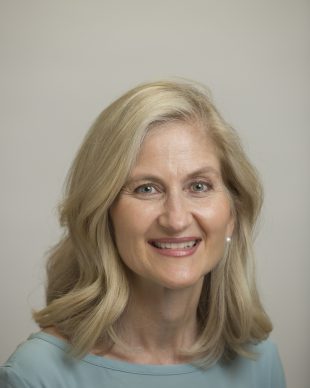
Cynthia Owens
For you, what is womanhood and what does it mean to you to be a daughter of God?
Sometimes it’s easy to think about what our womanhood isn’t. And I think first and foremost we should remember that we are children of God. And to know that He absolutely loves us and has blessed us with talents. He wants us to go forth and live life to the fullest, whether we are a man or a woman. And I do feel that as women we are given unique ways of communicating and showing our love and I think motherhood is part of that. But I think that ultimately, it comes down to being a daughter of God. I feel that He loves me; He knows me. Just like my father encouraged me to go into medicine because of who I am, I felt like my Father in Heaven recognized all that I could be, which is not just a doctor or a mother. He wants us to have joy in it all.
At A Glance
Name: Cynthia Owens
Age: 55
Location: Millcreek, Utah
Marital History: Married to Doug Owens since 1988
Children: Three boys (27, 25, 23) one girl (18)
Occupation: Pediatrician
Schools Attended: University of Utah, BYU Study Abroad in Austria, Reed College (graduated with BA in biology), Temple University Medical School, Yale University School of Medicine (graduated 1990 with MD), University of Maryland Medical System, Oregon Health Sciences University (completed pediatric residency)
Languages Spoken at Home: English (Learned German on mission)
Favorite Hymn: I Need Thee Every Hour, Lead Kindly Light
Interview Produced by Megan Armknecht
